 |
||||
Canadians in Cancún!by Kathleen Schoen 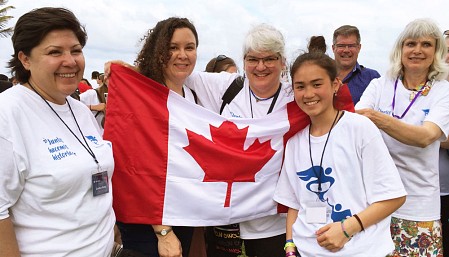 The first Suzuki Convention of the Americas was hosted by the Association Mexicana del Método Suzuki in Cancun May 1- 5, 2019. There were participants from an estimated 27 countries, including Canada! There is not room to list all the Canadian teachers here, but a special shout out to the three Canadian students who participated in the group classes and orchestras: violinist Natalie Leung and violist Erica Rose Leung from Ontario, and flute player Maica McEachern from the Northwest Territories. Student classes ranged from Suzuki Early Childhood, through pre-Twinkle up to Book Three. Students Book Four and up participated in the orchestras, playing violin, viola, cello, flute, recorder, piano, and guitar. Piano students had a range of masterclasses and recitals, and EVERYONE sang in the choir! Teachers shared experiences and ideas in many inspirational sessions. Hearing all the students, from babies to advanced players, coming from so many different places to make music together, really emphasized that “Every Child Can!” For more inspiration, plan to attend the SAA Conference in Minneapolis May 21-25, 2020 Suzuki Recorder at Open Recorder Days Amsterdam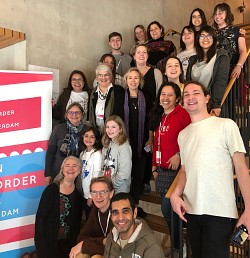 Open Recorder Days Amsterdam (ORDA) is a four day festival of everything recorder: concerts, masterclasses, instrument show, fringe festival, competition, new music, old music, composed music, improvised music …. all at the Conservatorium van Amsterdam. 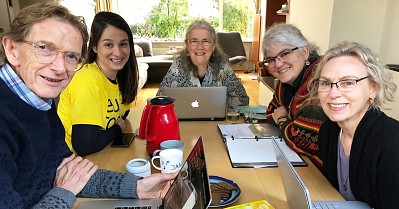 This year it was also the place where all the Suzuki Recorder Teacher Trainers congregated. Jaap Delver, the Suzuki Recorder teacher trainer from the Netherlands, hosted a Suzuki Recorder trainers meeting. Nancy Daly from Great Britain, Renata Pereira from Brazil, Mary Halverson Waldo from the United States, and Kathleen Schoen from Canada were present. In addition to all the Teacher Trainers, ORDA participants included Suzuki Recorder people from Iceland, Peru, and Brazil. STEP Under Construction!by Valerie Hewson The Suzuki Talent Education Program (STEP) of Newfoundland and Labrador has felt like a construction site over the past year, as we restructured our program to build a more stream-lined experience for families, teachers, and staff. To help lead our restructuring, we hired a consultant to get some outside perspective and expertise. For the life of our program, we had struggled with not owning our own facility and the scheduling challenges that came along with holding classes at a site with other competing bookings and events. Every year, our 18 group classes from September to June were held on whichever Saturdays the facility could accommodate. While this irregular schedule was less than ideal, we had accepted it as our fate. 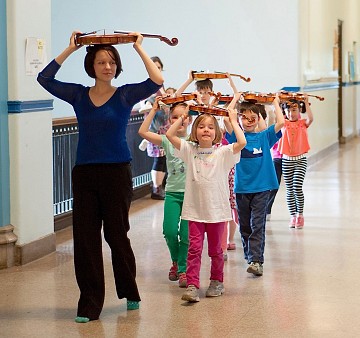 With the help of our consultant, however, we re-organized the 2019-2020 season into three, 11-week trimesters — fall, winter, and spring — each with nine Saturday morning classes in a three-on, one-off pattern. In order to implement this new, regular schedule, we found an alternative location for those weeks that couldn’t be accommodated at our regular venue. While we were initially nervous about families having to relocate for these few classes, the benefits of having consistent group classes have far outweighed the inconvenience accommodating a second location. The new spring trimester will allow the program to offer an additional trimester of our Music with your Baby classes, an Introduction to Viola class, and allow the STEP Fiddlers, our performing fiddle group, to meet to prepare for summer performances. Along with this new trimester structure, we’ve also reorganized our staff structure, offered spring registration, and added more social events for families. Most importantly, we’ve revived our Institute to offer flute and piano teacher training in order to financially support the Institute (due to dwindling numbers) and help expand the program generally. Musicianship Changes About 10 years ago, we introduced a Musicianship curriculum to supplement the foundations of music theory and sight-reading. This curriculum is rooted in the Suzuki philosophy, having parents participate in activities alongside their children. Originally, Musicianship classes started at age 6, but this year, we began a Dalcroze-inspired Music and Movement class for ages 3-6. From there, students will progress through levels following the order of the rainbow: Red, Orange, Yellow, and Green. After graduating Green, students are eligible to join our Reading Orchestra, which is the ultimate goal of our curriculum. Ideally, after completing the Musicianship program, our students will be ready to join our small orchestral performing group, the Young Virtuosi (Book 6 violin, Book 5 cello/viola). We have revamped the curriculum by adding a “purpose” to each level, creating a general structure of each class, and ultimately breaking down the curriculum into five concepts: Ensemble = playing together Ear Training = learning to identify by ear Pitch/Rhythm = identifying pitch and rhythm Writing music = writing/notation Practical Application = applying learned concepts to the instrument While we’ve taken off our hard hats — for now — the program is already reaping the benefits our constructive changes, and I look forward to more improvements and progress with our fabulous STEP team! The Benefits of Multi-generational Group Classesby Katie Avery I had the privilege of growing up in a folk community, where having a party meant making music, eating lots of food, and hanging out with people of at least three generations. I didn’t start to realize until I was a teenager what a rare gift that is in modern Canadian society. Even now, at 32 years old, I am still discovering the unique benefits that upbringing has given me. For example, I have never seen age as a barrier to friendship. What freedom! As a Suzuki teacher, I have found it incredibly gratifying to try and incorporate this multi-generational aspect of my folk upbringing into my studio. Living in Whitehorse, Yukon has many unique challenges; not the least of which is a constant fluctuation of the number of teachers. Over the last seven years, the number of Suzuki teachers has gone from one to three and back again more than once. As a result, my studio is diverse. I have violin students, and a handful of cello students. I teach kids, teens, and adults ranging in ability from pre-twinkle to Book 4 in all age groups. I have a private studio and an extra-curricular elementary school program, where I give masterclasses to kids during the school day. 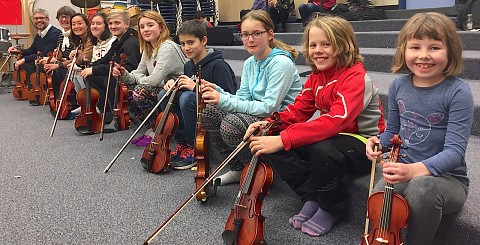 When my studio first started to diversify like this, I got some pushback from the community about teaching group classes based primarily on level and not age. “You can’t possibly teach a Book 1 group class that has 6 year olds AND 12 year olds in it!” I was told by certain parents. Not to mention putting 60 year olds in that very same class! Well, it turns out, I absolutely CAN teach a class that looks like that. Not only does it work, but it has also been incredibly gratifying to watch the friendships develop. Everyone benefits from this arrangement. The public school kids get the benefit of seeing my private students (who are often younger than they are) play with proper technique. This helps them be motivated to play properly as well because they can see the results. The adults are thrilled to see the enthusiasm of the kids and how willing they are to try things, which help them combat their own insecurities that often come with learning an instrument later in life. The younger kids behave better because of the older kids and adults around them. I also think there’s an intrinsic and incredibly valuable message there about learning being a life-long pursuit. I came to this configuration because of my location. It’s a small town, with limited resources and population. I have to do what I can to keep classes affordable for everyone. For me, that means having group classes with at least 8 people. To achieve that I had no choice but to teach multi-generational classes, but I’m so glad that’s where life has led me. Leadership Retreat blog post, May 2019by Susan Gagnon, Margot Jewell, Ellen Kogut, and Myra Yeung 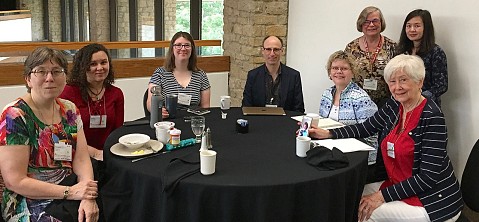 The windshield wipers are swinging fast and the four of us are sitting in a toasty car, zipping along the highway as the rain falls hard. We’re on the way back to Canada after the 2019 SAA Leadership Retreat at the Deer Creek Conference Center outside of Columbus, Ohio. It’s been both an energizing and exhausting three days of talks, meetings, and breakout sessions, and we’ve spent lots of time reconnecting and building relationships with other members of the Suzuki teaching community. We are mentally preparing for another week of teaching in our home programs in Oakville and Toronto, Ontario, and Montreal, Quebec, and agree that we are coming back with renewed enthusiasm for our mission. The beauty of the woods, lake, and natural surroundings at Deer Creek felt refreshing after a busy spring term. Margot recalls two beautiful sunrises and fireflies at night; Ellen enjoyed chatting with colleagues by the fire the night before. We take turns reflecting on the fresh ideas we are taking away from the retreat. “There were wonderful sessions by Canadian trainers on positive psychology [Elayne Ras] and wisdom [Alice-Ann O’Neil],” Susan says. She also appreciated cello sessions on using the fingerboard to teach theory and understand harmonic progressions. Susan adds that she enjoyed being reminded to engage the uncooperative three-year-old by talking through a finger puppet! She pops a pre-Twinkle CD called Soy Cellista into the player, from a new colleague, Andrea Espinzo, of Argentina. Margot shares that she has come away with some wonderful ideas for developing right- and left-hand violin technique. She spent much of her time at Suzuki Early Childhood Education (SECE) sessions and was also deeply touched by sessions on creating space and cultivating mindfulness. “A teacher’s energy can profoundly influence the learning environment,” she says. Ellen is looking forward to trying out new spiccato and sautillé exercises with her students. An outreach presentation on intergenerational learning inspired her, and she gained insight from Winifred Crock’s talk on 21st century translations of Dr. Suzuki’s commonly quoted statements. This was the first leadership retreat for Myra, who was happy to meet fellow violists from across the United States. She and Carmen Evans represented the Suzuki Association of Ontario in the chapter affiliate meeting and were inspired by the opportunity to share successes with other chapters. “I also enjoyed the viola brainstorming session for the next Conference,” Myra says. She also liked Fabio Dos Santos’ presentation on highlights from the Cancún Convention. The rain turns to drizzle as we make our way through Pennsylvania, then New York State, and finally Ontario. We are looking forward to another week of teaching and upcoming summer plans, and ultimately reuniting with an even larger group of Suzuki teachers, parents, and students next May at the 2020 SAA Conference in Minneapolis! How a Cello Teacher Goes on Vacation in Octoberby Diana Nuttall This year, my husband surprised me with a wonderful gift: a Musical River Cruise down the Rhine in October! I was thrilled! However, leaving my students for almost three weeks in the middle of the year concerned me, so I decided to ask a teacher to substitute for one of the weeks. I phoned Carey Cheney in Utah and she agreed to come! While we sailed up the Rhine with James Campbell, and the The Gryphon Trio, Carey Cheney would live in my house, in Edmonton, and teach my students. My students’ parents volunteered to pick her up at the Airport, and bring her all the food she needed (more than she needed, it turned out!). I approached the Edmonton Society for Talent Education to see if they would share her airfare if she stayed the weekend and taught a workshop open to all Suzuki cello students in town. Adele Bosse-Morgan jumped at the offer, and got her Board to agree. Then I realized that a number of teachers in town might be interested in working with Carey so I arranged a Friday morning teacher session. It rapidly filled up! 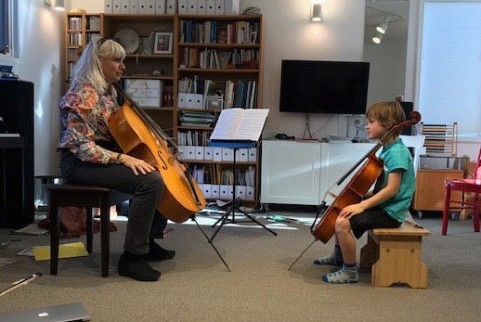 It turned out that Gail Lange was on the same cruise! While I visited Beethoven House in Bonn and ate Raclette in Zurich with Gail, Carey came, lived in my house and taught all my students! She ended the week at my house by doing a workshop for seven cello teachers on her books “Solos for the Young Cellist” series, and then did a weekend workshop for the Edmonton Society for Talent Education. As a result, all the Edmonton Suzuki Cello community enjoyed my trip! It was lovely to come home to students that were inspired by Carey’s teaching and enthusiastic about returning to lessons! What a great way to end a trip of a lifetime! Thank-you, Carey!Enrichment course for Two Canadian Suzuki Teachersby Gail Lange Suzuki teachers do enjoy their community! So when two Suzuki teachers met in unusual circumstances - a music cruise on the Rhine—there was an instant bond. Let me set the stage. During the past year, two Canadian music festivals – The Parry Sound Music Festival and the Ottawa Chamberfest – sponsored an amazing music cruise on the Rhine river in early October. The program was coordinated by George Zukerman, impresario and Director of Music for Special Travel International of Vancouver, in collaboration with STI Tourist Services of Vancouver. The cruise was preceded by two days of concerts in Amsterdam and followed up by two days of music events in Zurich, including a ballet in the Zurich Opera House. Diana Nuttall, a Suzuki cello teacher from Edmonton, and Gail Lange, a Suzuki piano teacher from Guelph, noticed each other’s names on the passenger list sent to participants before the cruise. So we were watching out for each other at the first welcome dinner. Subsequently, we sought out other opportunities to share perspectives on Suzuki teaching and Suzuki in Canada – not to mention politics in Alberta and Ontario! Strangely, our husbands happily found other things to do during these conversations! The tour was truly a highlight for musicians and lovers of music. The artistic director of the Ottawa Chamberfest is Roman Borys, cellist in the Gryphon Trio. So, a Hamburg Steinway was on board, ready for the Trio’s performances. Also, because the Artistic Director of the Parry Sound Festival is clarinettist James Campbell, we were treated to works for cello, clarinet and piano along with other combinations of instruments. Last but not least, jazz guitarist and composer Graham Campbell sometimes led late evening jazz jam sessions in the lounge. On our last day on the ship, Graham and the others all performed the “Rhine Rhapsody”, a piece he had composed for the occasion. What could be more idyllic than cruising up the Rhine listening to Mozart in a lounge with wide windows suitable for viewing the enchanting scenery on both sides of the river? Each day passengers had excursions to nearby cities such as Heidelberg and Strasbourg. The most notable one, however, was the stop in Bonn, where our musicians performed a concert in a recital hall adjoining Beethoven’s birthplace. Bonn is making big preparations for Ludwig’s 250th birthday in 2020, but we were fortunate to be there early! Of course, Diana and I each had our pictures taken in front of Beethoven’s statue in the main square. 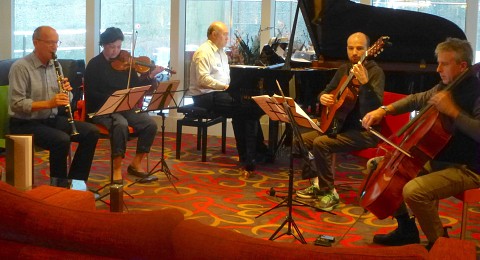 Our Canadian musicians during a practice session in the Lounge A side note: in Zurich, our post-cruise stop, Diana and I found an amazing music store, “MusikHug”, where there was a full floor of cellos, and another one of pianos and harps. Too bad nothing would fit in our suitcases! Just in case anyone is interested, the Gryphon Trio will do a music cruise on the Danube with Ama Waterways’ Ama Viola next September. We will be watching for it! SAO Conference 2019—November 2 and 3, Guelph, Ontarioby Anita Buttemer 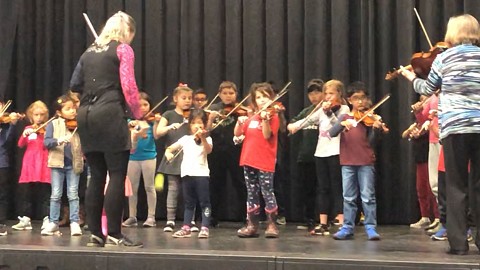 Recently my colleagues and I from Suzuki Talent Education of Waterloo (STEW) attended the annual student and teacher conference of the Suzuki Association of Ontario (SAO). This year the conference was in Guelph. Bravo Guelph Conference team! As has been the case every year, the teachers at STEW highly valued our time away together. We had 100% attendance by our faculty. Since the SAO Conference moves to a different venue every year, the experience is different as well. We are particularly happy that our colleagues from neighbouring provinces and states also attend when travel distances allow. On the Student Day, we had the opportunity to observe our students in group classes taught by wonderful teachers, and our students were able to reconnect with friends from past Suzuki institutes and workshops. These bonds are special ones – the children skipped to class, ate pizza, and had to chance to play their favorite pieces together. As teachers, the opportunity to chat with colleagues over dinner and back at the hotel is priceless. The chance to “talk shop” and discuss interpersonal challenges we encounter on a daily basis as Suzuki teachers, and in some cases as “practice parents”, brings home to us how person-to-person communication cannot be replaced by all the wonderful technology we now have at our fingertips. 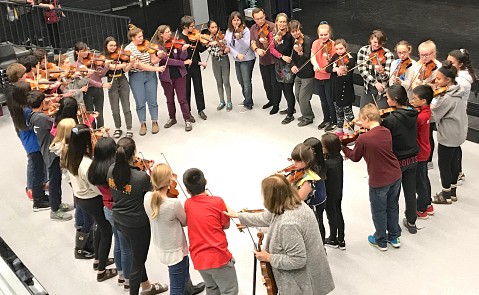 On the Teacher Day, we very much enjoyed informally meeting and chatting with colleagues. Some were new Suzuki teachers at their first conference. Others we may only be able to see once every few years, due to geographical challenges, and the scheduling conflicts that naturally come from being performing musicians. The keynote speakers at these SAO conferences are always thought provoking. The subjects are as varied as the locale of the event. Sometimes we are blown away by new ideas and new approaches. Sometimes we are affirmed that our teaching approach is on the right track, and that we are happily on the same page as the esteemed guest speakers. Either way, the experience is invaluable. I encourage all teachers to find a way to connect in person with our Suzuki community, whether it be attendance at a workshop, conference, convention, or merely driving to a “nearby” town to observe a colleague’s lessons for the day. Although we have geographic diversity and challenges, our commonalities as Canadian teachers greatly outweigh our differences. We can come together with music and make our country a better place! Refreshing New Experiences at the SAO Student Day in Guelph, Ontarioby Vivien Tzau & Sam Isono – Etobicoke, Ontario Our family had the pleasure of attending the SAO Student Day in Guelph on November 2, 2019. Like prior SAO workshops, this particular one did not disappoint! Our daughters, Tea (cello, Book 3) and Scarlett (violin, Book 1), benefitted immensely from their exposure to a different group of quality Suzuki teachers with different teaching methods, and their engagement with children from other Suzuki music schools in a unique group class and play-in. On this special day, the girls strayed from the customary and gained refreshing new experiences that will further develop their musical skill, knowledge and character. Young students in Scarlett’s enrichment class practised contrasting dynamics, rhythms, pattern recognition, movement, and ensemble playing, without fully appreciating at their young age that they were learning various musical elements and developing their listening skills. From Scarlett’s perspective, she was simply having fun! In Tea’s enrichment class, she was introduced to Bal-A-Vis-X for the first time. Tea thoroughly enjoyed the series of balance, auditory, and vision exercises, as did many of the observing parents who joined in. Deeply rooted in rhythm, these exercises kept the students focused and their brains sharp! We will definitely be applying these fun exercises at home. We love that Scarlett was able to observe the senior violin group class, and that Tea was able to observe students’ piano performances accompanied by a string quartet. The children are not the only ones who benefitted from this workshop. As parents, we love that we had the opportunity to marvel at the beautiful rich tones that filled the music hall when thirty cellists performed “French Folk Song” and “Scherzo” in synchronized harmony. And more importantly, we love that we were reunited with families that we have met at previous Suzuki conferences. These connections reinforce our deep sense of community within the Suzuki family. And, as we concluded this workshop we look forward to the next. Suzuki Association of Ontario Suzuki Conference 2019: A Parent’s PerspectiveSarah Hensen, a former Kingston Suzuki cello student herself, attended the recent SAO conference and shared her thoughts with KMK: My daughter has attended the Institut Suzuki Montreal and the Southwestern Ontario Institutes since she was 6 years old. This past summer because of conflicts she could not attend either. So when the opportunity arose to attend the SAO conference in Guelph we were so happy. My favourite part of Suzuki: you are not learning on your own but learning within a community. Arriving at the workshop, we ran into Paule Barsalou and she said “So nice to you again, Mirren, my goodness you are getting so tall.” For me as a parent, this is so touching to hear: teachers remember the children from year to year. It’s really lovely to have this familiarity and to be in a space where everyone feels that they belong. Though Mirren was the only Kingston student to attend, the smiles and the comfort level was soon evident even with the kids she didn’t know. As for myself, Teri Einfeldt’s parent talk gave me inspiration and a reminder that as a parent we are not alone. It was helpful to hear that other people have challenges, that their child too, learns differently and that in a world where everything is so competitive – even when people try not to make it this way—the Suzuki method allows you to move at your own pace. The 2019 SAO Student Day more than fulfilled all expectations for Mirren and myself. It was so worth the five hour drive from Kingston to attend and we can’t wait for the 2020 SAO Conference in Kingston! Interview Notes compiled by Karen-Michele Kimmett The Joys of Viola!by Susan Beth Barak We live in an intriguingly evermore interdependent, interdisciplinary world. Violists typically sit central to the harmonies around them and may be more aware of this than others – perhaps that’s why so many of the greatest composers favoured our beloved instrument. Although I relinquished my position as Viola Representative for the Suzuki Association of Ontario this year in order to gain voting rights as the 905 North Area Representative, my viola activities have continued to expand in the past year. In 2018 I became Chair of the Non-Discrimination Committee of the American Viola Society (AVS) and have been particularly involved in leading a review ensuring inclusive and non-discriminatory language in AVS publications. Also related to language, I was privileged to share a presentation at the European Suzuki Viola Gathering in El Escorial, Spain, in February 2019, tying together insights gleaned from my theoretical research into language acquisition as they apply to teaching instrumental music. I am presently synthesizing my academic papers into an article to submit to the American Suzuki Journal. Stay tuned! I highly recommend going to the next ESVG in 2021 – the camaraderie at the Gathering is spectacular and immensely joyful! Kudos to Peter King, Joanne Martin, and Juan Drown for an outstanding job putting together a truly memorable, enriching, and heartwarming event. Building a Teaching Studio from Scratch in a Remote Communityby Margot Jewell Lance Stoney is the only Suzuki trained violin teacher in Fort St. John, a BC town of 20,000 on the Alaska Highway, a 14-hour drive from Vancouver. He has one Suzuki colleague in town, a pianist. The nearest Suzuki violin teachers are in Prince George (4 1/2 hours) and Edmonton (7 hours away). These distances make it difficult to collaborate with musicians outside of Fort St. John, although Lance and some of his senior students participate in a summer orchestra program in Smithers, BC (9 1/2 hours away). At age 3, Lance started studying violin at a Suzuki program in southern BC. He kept playing through high school, and took some RCM practical and theory exams. Then when he started working at other jobs, music went on the back burner. Thirteen years ago Lance moved to Fort St. John for work. People in the community learned he played the violin and a child wanted to start studying with Lance. By 2018, his studio had grown to 60 students so he was able to give up his job in the oil patch. In a phone conversation, he shared the following thoughts: About professional development: * A few years after starting to teach, he decided that he would pursue Suzuki training. Almost every year Lance has taken courses at the Suzuki Institute in Seattle. He also appreciates the opportunity to watch a variety of teachers when at an institute. He feels that people who are “pioneering” need to find out if they are on the right track, and refresh themselves with new ideas. It is harder to access this when living in a more isolated community. He said “personal development as a teacher is a must for building the studio.” * He has continued working on his own playing, successfully completing his grade 10 RCM exam last year. About building a program from scratch in a small community: * You have to be willing to work with all ages. He teaches students from age 4 to 65. * You have to be open to different approaches. Some are people interested in fiddle music and others in sacred music. He explains that “the classical approach is the push-ups and sit-ups of learning the instrument.” Once you have a good foundational technique you can learn any style of music. * Collaborate with the local musical community. He puts his intermediate and senior students together with the adults to make a string group that can accompany the local adult choir in performances of Handel’s Messiah, Vivaldi’s Gloria, Schubert’s Mass. His advice: * Set teaching priorities. Don’t waste time on things that are not as important, or you will get frustrated and irritated by teaching. His vision: * Teaching is fun when you’ve got a range of levels and ages. * The goal is to “provide educational development for the local community; both amateur adults and children.” Oakville Suzuki Association Quartet Programby Jean Grieve Last year in our Oakville Suzuki program, we discovered that we did not have enough senior students registered in our association (past Book 4) to run our advanced violin groups. We decided to offer a quartet program where each group arranged with a teacher to meet at a time everyone could manage for approximately 18 sessions in the year. To our surprise a large number of students signed up, and we formed eight quartets and all registered with Oakville Suzuki. We set two pieces that everyone could play together at our Senior Christmas concert, and arranged for a special masterclass with Witold Swoboda in April where each group performed a classical piece. Several of the quartets also performed at festivals and seniors’ residences. The most successful groups were those where the students were already friends, and they signed up again this September. We now have five groups but one has not been able to find a teacher at a time when the students can get together. This is one of the biggest problems when parents, teachers, and students are very busy. There is no doubt, however, that we will continue to offer the option for our senior students. 2nd Suzuki Teacher Trainer Convention 2019by Paule Barsalou Canada was well represented at the 2nd International Suzuki Teacher Trainer Convention 2019 in Madrid in October. Canadians present were Suzuki teacher trainers Paule Barsalou, Wan Tsai Chen, Carey Alain Cheney, David Evenchick, Susan Gagnon, Dorothy Jones, Sharon Jones, Joanne Martin, Alice Anne O’Neil, Kelly Williamson, and Nicole Wilton. Also present was Margaret Parkin, ESA Instructor of Violin. The format of teacher training in each region and reciprocity between regions were discussed in several sessions. Reciprocity between SAA and ESA is described in the ESA teacher training manual: http://www.digital-e-brochures.com/EuropeanSuzuki/TTraining2018/30/ Dorothy and Sharon Jones presented a session on Suzuki Early Childhood Education. Kelly Williamson presented a session called Time to Stretch! Teacher Training in a New Area, where she outlined her experiences teaching in Latin America. Paule Barsalou was on a panel discussing called Suzuki Teacher Training in Universities, alongside Kathleen Springs from University of Colorado, and Veerle Van Gorp, Wim Meuris, and Wilfried Van Gorp from AP School of Arts in Antwerpen, Belgium. She shared her experience in developing a new long-term teacher training program in a collaboration between Suzuki String School of Guelph and Wilfrid Laurier University in Waterloo, ON. Karen-Michèle Kimmett joined the conference via Skype and spoke on a panel called Suzuki Teacher Training in Diverse Environments, alongside Eduardo Ludueña (who talked about training violin teachers in Latin America), Helen Brunner (who related her recent experience training violin teachers in Russia) and Carmencita Arámbulo (who discussed her experience training piano teachers in the Philippines). Karen shared her experience training violin teachers in South Africa and Zimbabwe in collaboration with trainers Martin Rüttimann and Christophe Bossuat. Joanne Martin spoke on a Panel called Suzuki Teacher Training – Then and Now, alongside Judy Bossuat-Gallic, Christophe Bossuat, Akira Nakajima, Sven Sjörgren, and Tanya Carey. She described her experience as a Suzuki teacher trainer pioneer in Canada. Carey Cheney, David Evenchick, Susan Gagnon and Margaret Parkin were each charged with the delicate task of leading discussions such as Goals for Book 1 and Examinations and Assessment, Suzuki in Universities and Mentoring Teacher Trainers, and Reciprocity Procedures and Challenges Suzuki Teacher Trainers are Facing. This was not far from the type of exchanges one would hear at the United Nations! Bravo to this foursome for their tact and diplomacy in handling these discussions. A huge thank you is extended to teacher trainers Martin Rüttimann and Carey-Beth Hockett for their vision in organizing this wonderful conference. |
||||
|
You received this message because you are a member or supporter of the Suzuki Association of the Americas. Suzuki Association of the Americas |
||||